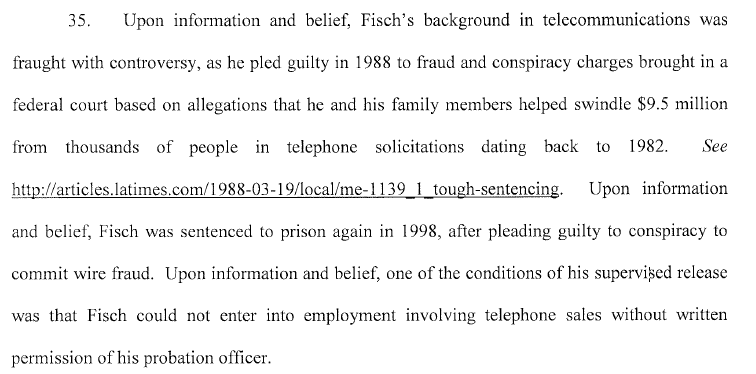Legal Briefs
Attorney Suing Dozens of MCA Companies Disqualified as Counsel
January 29, 2018 Rayminh Ngo, an attorney with Higbee & Associates that has appeared in no less than 80 lawsuits against merchant cash advance companies in New York State, hit a fatal roadblock in one case, court records reveal. That’s because Ngo and Higbee aren’t qualified to practice law in the State of New York. This disturbing matter was brought to light and evaluated by the Honorable Jerome C Murphy, a judge in Nassau County, late last month.
Rayminh Ngo, an attorney with Higbee & Associates that has appeared in no less than 80 lawsuits against merchant cash advance companies in New York State, hit a fatal roadblock in one case, court records reveal. That’s because Ngo and Higbee aren’t qualified to practice law in the State of New York. This disturbing matter was brought to light and evaluated by the Honorable Jerome C Murphy, a judge in Nassau County, late last month.
Platinum Rapid Funding Group, the plaintiff against a party that Ngo was representing, argued that the defendant’s attorney was in violation of Judiciary law §470, specifically that Ngo and the law firm did not have an office in New York State and consequently could not represent a client in New York.
Ngo denied the assertion and argued that he did in fact have offices there. But the evidence was not on his side. The two addresses he provided turned up empty, according to process servers who visited both locations. And the lease agreements submitted as exhibits were not valid for the time period in question.
“In the end, this Court finds that there is no evidence on this record that Ngo and Higbee had physical addresses in New York,” the order on the matter read. Ngo and Higbee were therefore disqualified as counsel of record. They have filed a notice of appeal in response.
That he has appeared in dozens of other lawsuits in the State was not addressed in the order, but it may be worth noting to his opponents both past and present that pursuant to this Court, they cannot practice in New York.
You can view the decision here.
The decision arose in Platinum Rapid Funding Group, Ltd. v. H D W of Raleigh, Inc. d/b/a Pure Med Spa, a/k/a Pure Cosmetic and Surgical Center and Holly Donielle Wybel a/k/a Holly D. Wybel, Index # 605890/2017 in New York Supreme Court.
MCA Helpline, A Debt Settlement Company, is Sued For Tortious Interference
January 25, 2018
Debt settlement is under fire again. This time it’s a trio of defendants, namely MCA Helpline, LLC, Decision One Debt Relief, LLC and Todd Fisch individually, according to a complaint filed by plaintiff Everest Business Funding on Wednesday in Broward County, Florida.
Everest is seeking damages for Defendants’ tortious interference with at least a dozen of its merchant contracts.
“Defendants have engaged and continue to engage in the business practice of making misleading representations to Everest’s customers; namely, promising to save the merchants money on their existing contracts with Everest when they have no intention or ability to uphold such a promise,” the complaint states. “In so doing, Defendants tortiously interfere with Everest’s merchant agreements by inducing the merchants to breach their contractual obligations to Everest in favor of entering a new payment relationship with the debt relief company.”
Fisch is alleged to be the mastermind behind both MCA Helpline and Decision One Debt Relief.

Complicit ISOs were also put on notice. “To the extent any specific ISOs or their affiliates who have ISO Agreements with Everest have leaked information about Everest’s merchants to Defendants, or to any other third party, such conduct constitutes both a breach of the ISO Agreement and tortious interference with Everest’s merchant contracts,” it reads. “Through the course of discovery in this lawsuit, Everest plans to add as additional Defendants, as yet unidentified ISOs, which have been working with Defendants to target Everest’s merchant accounts in violation of their contractual agreements.”
Everest has been vigorously pursuing debt settlement companies. In September, they, along with Yellowstone Capital, filed a lawsuit against eight defendants (later amended to include 1 more) in New York.
Another lawsuit examining similar issues was also filed last year in New York. In Pearl Gamma Funding and Pearl Beta Funding v Creditors Relief, Pearl tacked on a defamation claim in addition to tortious interference. That case is still pending.
Defendants in Forged COJ Case Failed to Respond to The Complaint
January 16, 2018The lawsuit brought by FundKite against defendants alleged to have forged a Confession of Judgment (COJ) is not going so well for the defendants. Last week, FundKite filed a proposed order for a default judgment since none of the defendants ever appeared to defend themselves.
 Meanwhile, circumstances surrounding the suspicious notary stamp on the COJ in the case have become a lot more clear. Originally, the merchant asked how a New York notary stamp ended up on the documents he claims are forged when the merchant himself resides in Florida.
Meanwhile, circumstances surrounding the suspicious notary stamp on the COJ in the case have become a lot more clear. Originally, the merchant asked how a New York notary stamp ended up on the documents he claims are forged when the merchant himself resides in Florida.
According to an affidavit by Jennifer Gately, the notary, she was asked by someone employed by the ISO to sign off on a document for a merchant without the merchant present. She refused. Soon after, her notary stamp was stolen. She not only reported this theft to the National Notary Association, but she also filed a police report.
The relationship between the person working for the ISO and her, is that they both lived at the same address, explaining how the theft would’ve been relatively easy to carry out.
“I have never worked with any of the listed defendants on any matters, including concerning financial transactions,” she declared.
The case is filed under Index Number: 656692/2017 in the New York Supreme Court. You can download the original complaint here.
Stacking Lawsuit Trial Date Set
January 16, 2018The lawsuit between RapidAdvance and Pearl Capital has a trial date, June 25, 2018. RapidAdvance, who filed the complaint in 2015 in the Circuit Court for Montgomery County in Maryland, has sought to recover damages for tortious interference.
Considering that RapidAdvance’s loan to the merchant at hand was only for $31,000, this litigation, which is now more than 2 years-old and scheduled for trial, is likely more about the parties attempting to set a precedent.
The case is Small Business Financial Solutions, LLC v. Pearl Beta Funding, LLC Case No. 411478-V.
Judge Okays Leave to Add Additional Defendants in Kalamata Capital / Biz2Credit Lawsuit
December 12, 2017A three-year-old lawsuit pending in the New York Supreme Court has experienced a flurry of motion practice, according to the docket. The latest order issued by the Honorable Kelly O’Neill Levy granted Kalamata Capital leave to amend the complaint to include both Direct Lending Investments, LLC and Direct Lending Income Fund LP as defendants.
A key claim in this case is the allegation of tortious interference. A previous legal brief on the matter can be read here.
The case can be found in the New York Supreme Court under index number 653749/2014.
MCA Funder Asks Court to Set Aside Default Judgment in Usury Case
November 10, 2017If it wasn’t for the Usury Law Blog, an MCA company may never have known about the default judgment entered against it in Florida for usury, according to documents filed in the case.
On Wednesday, the funding company filed a motion to set aside the default judgment and reopen the case on the basis that the in-house attorney handling the case for them left the company in September. The company had no way of receiving case notices after he left, they say, because the attorney had used a non-company email address as the email of record with the Court.
The funding company’s new attorney only became aware of the case when the Usury Law Blog published an analysis of it, they say.
The Court has initially denied their motion without prejudice on the basis that procedure requires that they certify that they have conferred, or describe a reasonable effort to confer, with the parties affected in good faith effort to resolve the dispute. Presumably, the funder can refile the motion once the defect has been cured.
ISO Alleged to Have Forged a Confession of Judgment
November 6, 2017 Underwriters, keep your eyes on the notary stamps.
Underwriters, keep your eyes on the notary stamps.
A lawsuit filed in the New York Supreme Court last week by a merchant cash advance company against an ISO and several co-defendants, alleges that an ISO was partially responsible for damages when a merchant defaulted.
And they make a compelling argument. In this case where a Confession of Judgment (COJ) was required to approve the deal, the merchant, who defaulted within 30 days of being funded, claims to have never signed one, despite the ISO having delivered a signed one to the funder.
Well then who signed it?
Upon inspection, the notary stamp on the COJ belonged to a notary in Nassau County, NY, where the contract logically would’ve been notarized. But the merchant is based in Florida and claims to have been in Florida at the time the COJ was allegedly signed.
So who would’ve been in Nassau County that day?
According to the funder, it was the ISO, since the ISO is based on Long Island and the ISO is the one that delivered the signed COJ to them.
These are just the allegations at this point, of course, since the defendants have not even yet had a chance to respond.
The complaint, however, adds another twist, that after the ISO got the deal funded, they then referred it to a debt settlement company, who assisted the merchant in defaulting.
As you might imagine, the debt settlement company is a named co-defendant.
The case is filed under Index Number: 656692/2017 in the New York Supreme Court. You can view the entire complaint here.
Stacking Lawsuit Could Go to Trial
October 18, 2017 A lawsuit between RapidAdvance and Pearl Capital that has been making its way through the Maryland state court system for two years may be heading to trial.
A lawsuit between RapidAdvance and Pearl Capital that has been making its way through the Maryland state court system for two years may be heading to trial.
In this case, plaintiff Small Business Financial Solutions, LLC (SBFS AKA RapidAdvance) alleged that Pearl Beta Funding, LLC (AKA Pearl Capital) interfered with a loan agreement it had with a merchant when Pearl “stacked” financial obligations to Pearl on top of the obligations the customer owed to SBFS. Ultimately the merchant defaulted and SBFS wants to hold Pearl responsible for the damages it incurred.
Pearl originally moved to dismiss the suit but was unsuccessful. Later, Pearl filed a motion for summary judgment. On September 29th, that motion was denied, with the judge opining that issues of fact remained that were best left for a jury.
Unless Pearl appeals the decision or the parties settle, the case will go to a jury.
A representative for Pearl Capital declined to comment on the decision, citing ongoing litigation.
Patrick Siegfried, Assistant General Counsel for RapidAdvance, opted to tell deBanked the following:
“The court’s decision from many months ago to reject Pearl’s motion to dismiss and its more recent decision to reject the motion for summary judgment and permit this case to go to trial confirms the anti-stacking position RapidAdvance has consistently taken. The court’s rulings make it clear that when a funding company funds a merchant knowing that doing so is a breach of the customer’s agreement with another funder and the stacker’s funding is a substantial cause of the merchant defaulting with the other funder, its actions constitute tortious interference. As a result, the company that stacked can be held liable for the losses the original funder incurs. While the outcome at trial is impossible to predict as the court will need [to] decide whether there are sufficient facts to satisfy each element, RapidAdvance is pleased that its legal reasoning on stacking has been confirmed in a written opinion and that we now have the roadmap for pursuing others that tortiously interfere with our contracts by stacking.”
Of note, is that RapidAdvance brought this case in The Circuit Court for Montgomery County, Maryland. Few other players in the industry may be able to designate Maryland as the proper venue. The standards for tortious interference may not be the same in other states. There are many circumstances in the case not discussed in this synopsis. Consult an attorney before drawing any conclusions. YOU CAN DOWNLOAD THE FULL DECISION HERE.
The case is Small Business Financial Solutions, LLC v. Pearl Beta Funding, LLC Case No. 411478-V in the Circuit Court for Montgomery County, Maryland.





























